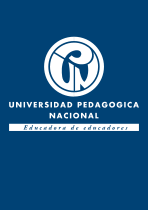Educación escolar, vida comunitaria y uso de las lenguas : reflexiones sobre el proceso en el pueblo nasa (paez).

Citación
Fecha
2005-02-01Autor
Ramos Pacho, Abelardo
Rojas Curieux, Tulio
Enlace al recurso
https://revistas.pedagogica.edu.co/index.php/RCE/article/view/7718Palabras claves
Educación propia
Uso de lenguas
Educación intercultural
Proyecto Educativo Comunitario (PEC)
Metadatos
Mostrar el registro completo del ítemResumen
Este artículo presenta un punto de vista sobre la educación escolar en la vida del pueblo nasa(paez). Se busca resaltar la trascendencia en los procesos de reafirmación de la identidad nasa yde la revitalización cultural.La perspectiva involucrada consulta los conceptos en nasa yuwe (lengua páez) y la manera comose combinan las distintas fuentes de conocimiento en el proceso de formación de las nuevasgeneraciones. Así, la relación escuela-comunidad pasa de ser sólo un planteamiento para volver-se el eje del trabajo de formulación de los Proyectos Educativos Comunitarios de acuerdo conlas particularidades y los proyectos de las comunidades concernidas. El uso de la lengua nasacomo lengua de conocimiento, más que como asignatura, se convierte entonces en una apre-miante necesidad, e implica desarrollar procesos de apropiación de la escritura en la vida, sinpretensiones excluyentes o hegemónicas.
Abstract
The topic in the following article involves a point of view on the primary school education in theNasa ́s (Paez) town life. It wants to stand out the importance of the reaffirmation processes of theNasa people ́s identity in their new generations and reinforce their culture.The text includes perspectives on consultation about the concepts immersed in the Naza Yuwe(Paez Language), and the way they combine the different sources of knowledge in the newgeneration forming process. Thus, the relation among school and community gets a real importancewhen it becomes the main point of the work of reformulation in the Communitarian EducativeProjects, having in mind the particular features and purposes of the communities involved.The use of the Nasa Language as a language of knowledge, more than just a school subject,becomes a stressing need and involves the development of processes for the appropriation ofwriting in their lives without excluding or hegemonic pretensions.
Editorial
Editorial Universidad Pedagógica Nacional
